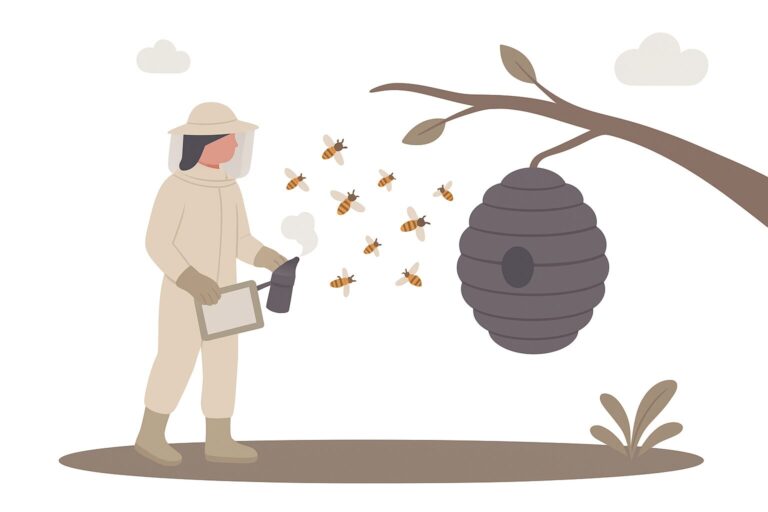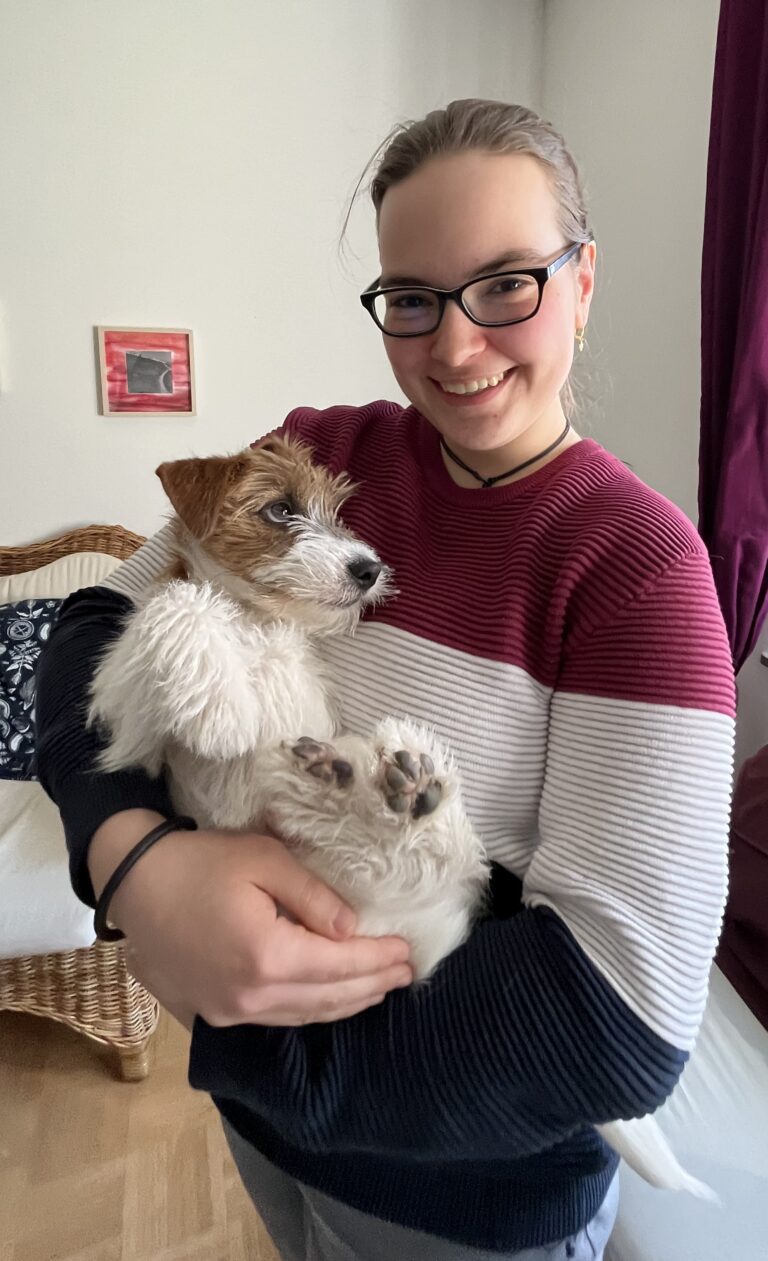Animal communication bees

Your key to truly understanding your swarm
You are fascinated by your buzzing colony, but sometimes you just don’t understand what is going on with them. Why do they suddenly swarm? Why do they seem restless even though the nectar flow is good? Why do they react aggressively on certain days or in certain weather conditions, even though they are usually so peaceful?
Perhaps you have already tried everything: beekeeping courses, reference books, new hives. But the questions are still there. You ask yourself: “What am I overlooking? Why can’t I understand the needs of my own colony and help them?”
This is where animal communication comes in. It allows you to see the world through the antennae of your bees and finally understand what they have been trying to tell you for so long.
What is animal communication and why does it work with bees?
Animal communication is an intuitive method of connecting with animals on a deeper, energetic level. Unlike traditional beekeeping, it is not about controlling the strength of the colony or the honey harvest, but about perceiving and understanding the collective thoughts, feelings, and needs of your swarm.
Bees are particularly receptive to this type of communication because they themselves are highly sensitive beings that are part of a larger whole. They react to the slightest energies, vibrations, and environmental changes, much more than we often realize. But because they cannot respond with spoken words, many of their messages go unheard. Until now.
When can animal communication help?
Perhaps you are still unsure whether animal communication is right for you. Many beekeepers have reservations at first, until they experience how profound the results can be. Here are some situations in which animal communication can offer a solution:
1. Your colony is exhibiting inexplicable behavior
- It becomes aggressive or restless for no apparent reason.
- It builds wild combs or refuses to accept honeycombs.
- It swarms despite having sufficient space and care.
What animal communication can do here:
Through contact with the bee (consciousness), you will learn what is really behind the behavior. Perhaps a low-frequency humming noise in the neighborhood is disturbing them. Perhaps they feel uncomfortable with the energy of a certain place or material (e.g., the color of the hive). Once you know the trigger, you can work on it specifically.
2. Your colony seems weak or stressed, but you don’t know why
- The colony’s development stagnates for no apparent reason.
- The bees seem disoriented or listless.
- They are more susceptible to disease.
What animal communication can do here:
A colony can suffer from stress that is not visible to us. Through animal communication, we can find out whether your bees are suffering from electromagnetic radiation, whether they are struggling with the sprayed forage plants in the area, or whether a general discomfort is weakening them.
3. Your colony has had a difficult start or past
- You have captured a swarm and it does not want to establish itself.
- The colony comes from an unsuitable environment.
- It reacts with panic to certain weather phenomena.
What animal communication can do here:
Colonies carry collective experiences within them. Through animal communication, you can find out exactly what happened to them and help them settle into their new home and gain confidence. Furthermore, you can often help your swarm through surrogate work. This can be done through surrogate hypnosis or surrogate work using quantum work.
4. You are facing a big change and want to prepare your colony for it
- A change of location is imminent.
- You want to switch to a more species-appropriate form of beekeeping.
- A new queen is being introduced.
What animal communication can do here:
Bees understand our intentions and sense changes. Through animal communication, you can explain the reasons for your actions to the colony, ask for their cooperation, and thus give them security for the upcoming change.
5. Your colony is sick and you want to know how you can best support them
- They are suffering from mite infestation or other diseases.
- You want to avoid chemical treatments and find natural ways to help.
- You wonder what the colony really needs to get healthy.
What animal communication can do here:
In this critical phase, animal communication helps you understand the true needs of your colony. Perhaps they want a sunnier spot, a different herbal supplement, or simply more peace and quiet. They can tell you how they want to support their own vitality.
How does animal communication with bees work?
You may be wondering, “Sounds good, but how does it work exactly? Does my colony have to be present?”
- Preliminary talk with you: You describe your questions and concerns to me.
- Contacting the bees: I connect telepathically with the consciousness of your bee colony. This is often done using a photo of the colony or the apiary. Your bees do not need to be present.
- Receiving messages: I perceive feelings, images, words, or even sensory impressions (such as smells or tastes) that the colony sends me. These are often collective feelings or pictorial representations of their situation.
- Feedback to you: I pass on all the information to you in the form of a written transcript of the conversation, for example.
Common concerns and why they are unfounded
- “That sounds esoteric. Can it really work with an insect?”
Animal communication is not magic, but an intuitive ability that works on an energetic level. Bees, as highly complex superorganisms, are particularly receptive to these subtle levels of communication. Many beekeepers report amazing results. - “A bee colony is not an individual! Will that work?”
A swarm also has a collective consciousness and a shared energy. Communication takes place with this “spirit of the colony,” which carries the needs and experiences of all the bees within it. - “I’ve tried so many things… Why should this help now?”
Conventional methods often address the external symptoms. Animal communication goes one step further: it reveals the deeper, often energetic or emotional causes. When you understand why your colony is acting this way, you can tackle the challenge at its root.
Reviews from satisfied owners
I booked Ms. Lang for an animal communication session.
The client receives the result in writing, preliminary talks were very informative. The assignment (questions for the animal) is determined in advance, so that I as the client also have the opportunity to address specific issues. I find that very good.
At the results meeting, Ms. Lang explains the protocol and it is very informative. Any queries are explained very well and clearly.
I hope to be able to help my cat better with the information and will let the animal communication work on us.
Thank you for your work and the trust you have placed in us.
Andrea Kurth
Satisfied dog owner

For me, the basis of trust is very important for the success of a consultation and the success of such an approach. This was absolutely successful! Empathy and individual appreciation in the joint session were outstanding.
I can highly recommend Larissa.
Markus und Gisela Sieber
Satisfied clients

Your next step
If you are ready to get to know your bee colony on a whole new level, book an animal communication session now. Whether you are looking for answers to a specific problem or simply want to deepen the harmonious relationship with your swarm, I will accompany you and your bees with empathy and professionalism.
You are not alone with your questions. Many beekeepers were skeptical at first and are now grateful that they took this path. Your colony is waiting for you to finally understand them.
I look forward to conveying the messages from your bees to you.
Note:
Animal communication and / or surrogate work are not a substitute for veterinary treatment.
However, after consultation with the practitioner, animal communication and / or surrogate work can be used as a supportive measure.

